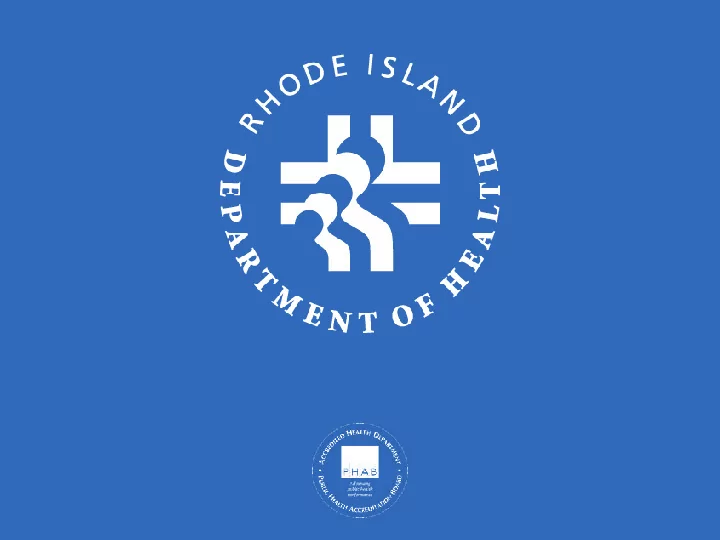

Prescribing for Pain as Painlessly as Possible James V. McDonald MD, MPH Chief Administrative Officer Board of Medical Licensure & Discipline November 3rd, 2016
Dr. McDonald has no disclosures to report.
Objectives 1.Discuss rules and Regulations regarding pain and controlled substances 2.Discuss need to treat pain and balance the risk of opioid medications
What is the issue and what is your perspective? • What is pain to you? • Is pain a good thing ever? • How do you act when you are in pain? • How do you perceive people in pain? • primum non nocere--above all, do no harm • Risk & Benefits
Like many other states, Rhode Island’s crisis began with prescription drugs Building on a Strength • Since 2011, the number of prescription-based overdose deaths has declined by nearly 40 Deaths Caused by Prescription percent. Drugs Have Leveled; Deaths from Illicit Drugs on the Rise More Work to Do 300 • Illicit drug overdose deaths are up 250 percent since 2011. 225 • Overdose deaths caused by a 150 combination of illicit drugs and prescription opioids are up nearly 75 a third since 2011. 0 2009 2010 2011 2012 2013 2014 2015 Rx medication Illicit drug +Rx medication Illicit drug SOURCE: Rhode Island Department of Health 6
Rules, regulations & guidelines Rules and Regulations Guidelines • Force of law • Good ideas, yet need judgement • Minimum standard • What you should do all • Exceeding this is good the time • Promulgated by • Exceeding these are Department of Health hard and following is good • Promulgated by anyone
Rules and Regulations for Pain Management, Opioid Use and the Registration of Distributors of Controlled Substances in Rhode Island Approved March 2015 Applies to anyone with a CSR • 3.2 Document a treatment plan • 3.3 Duration of prescribing (superseded by PL 199) 30 Mg MED and no more than 20 doses for acute pain • 3.4 Patient Education/Consent (duty to patients with history of substance abuse is higher) • 3.5 Must review PDMP prior to starting an opioid
Rules and Regulations for Pain Management, Opioid Use and the Registration of Distributors of Controlled Substances in Rhode Island 3.7 Periodic Review 3.8 and 3.9 what is a pain physician and documentation of consultation 3.10 Transition of Care 3.11 Transmission of controlled substances 3.12 long-acting opioids including methadone
Art of Medicine and how we address pain • Have I considered the psychosocial impact of pain? • Am I treating pain or suffering or both? • What are the non- pharmacologic options? • What are the non-opioid options? • Am I taking an interdisciplinary approach?
When is enough – enough or too much? • Morphine Mg Equivalents per day • Feeling pressured or bullied • Not sure of the diagnosis • Do not feel comfortable with the medications • Not willing to follow the regulations
What are my obligations regarding long term opioids • Is there an evidence base for this prescribing decision? • Am I willing to follow all of the regulations? • Was there any other option with less risk? • Does the patient understand how there life is going to change?
How do I recognize Drug seeking behavior? Can I ? • Non-narcotic drug • Lost RX- Treat as allergy cash • 3 visits in 7 days • Drugs by Name • Over 3 complaints • Vague unprovable • Chief Complaint of “refill” symptoms- back ache, headache, • Multiple visits to ED’s dental pain • Inconsistent story about pain, medical history • Manipulative behavior • Bullying PDMP offers some help
Practical tools Health.ri.gov/saferx • History with Pain? • History with Psychoactive substances? • Family history relevant to addiction? Opioid Risk Tool DAST COMM SOAPP
Rhode Island Will Reduce Overdose Deaths by One-Third in Three Years Governor Raimondo’s Overdose Prevention and Intervention Action Plan focuses on four specific and complementary strategies designed to cut the number of lives lost to overdose by a third within three years: ➢ Prevention : Take aggressive measures to improve patient safety and better monitor opioid use through the Prescription Drug Monitoring Program. ➢ Rescue : Ensure access to naloxone ➢ Treatment : Expand the quality and availability of Medication- Assisted Treatment (MAT) ➢ Recovery : Expand access to peer-recovery services and MAT In addition, her action plan outlines a public education and community outreach plan to end the stigma of addiction. 15
James V. McDonald, MD, MPH Board of Medical Licensure and Discipline Rhode Island Department of Health James.mcdonald@health.ri.gov
Recommend
More recommend